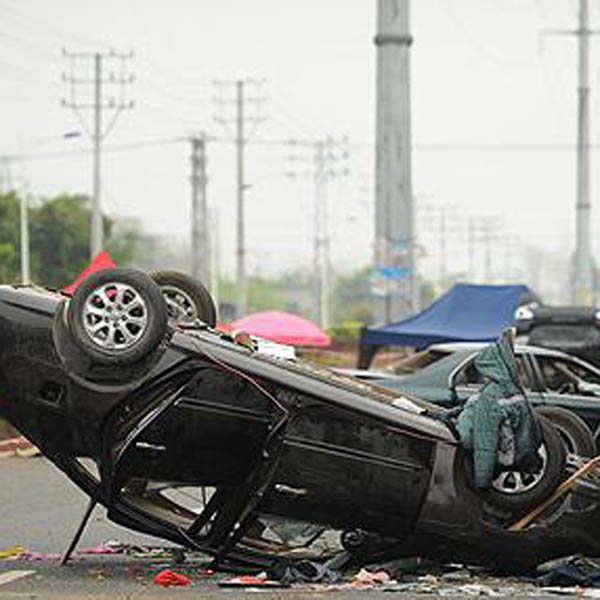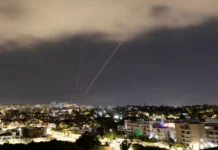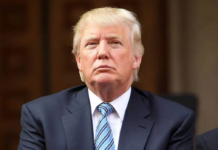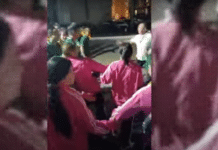Villagers in Shangpu occupy public square and demand democratic vote over land seizures
Zhang Shujie and Vincent Kolo, chinaworker.info
Yet another Guangdong village has risen in revolt against illicit land sales. Yet another tense standoff is underway between protesters, at the end of their patience over official corruption, and large numbers of security personnel deployed by local CCP (Communist Party) leaders. The protests in Shangpu, which revive memories of the epic Wukan village rebellion of 2011, come at the worst possible time for the Chinese dictatorship. On Tuesday the rubber-stamp National People’s Congress (NPC) opens its annual session, to cement the handover of power to Xi Jinping and the new princeling-dominated leadership. The struggle in Shangpu provides a vivid reminder of the stark economic reality for the masses, far away from the splendour and billionaire lifestyles of the CPP elite gathered in Beijing.
China experiences more than 180,000 “mass incidents” every year – street marches, strikes or violent disturbances. Fully two-thirds of these incidents are related to the seizure of farmland for development. A joint study by US-based Landesa Rural Development Institute, Renmin University in Beijing and Michigan State University conducted in 2011 revealed that on average 4 million people lose their land to government expropriation every year.
In Wukan, during the autumn of 2011, a community of 15,000 rose up after years of illegal land sales by unelected village chiefs in cahoots with property developers. The mass mobilisations, ejection of the hated Wukan village council, repression and death of a protest leader in police custody, drove the provincial government into a corner and resulted in promises of significant concessions to the people of Wukan by then Guangdong boss Wang Yang and his representatives.
There is keen interest in China and abroad over the current events in Shangpu. Is Wukan about to be replayed? Will the new provincial leadership under Hu Chunhua intervene as his predecessor Wang did to broker a deal? Can Shangpu’s struggle win concessions from the one-party state? For struggles like those in Shangpu to achieve victory and secure their main demands it is necessary to draw up a balance sheet of what has happened in Wukan since the government’s apparent climb down in December 2011.
Today, many Wukan locals feel frustrated and cheated that most of their original demands from the mass struggle have not been met, despite winning the right to replace the old corrupt council with an elected village council, in elections held this time last year. Clearly, some crucial lessons must be learned.
“Occupy Shangpu”
In Shangpu, with a population of 3,000 people situated around 100 kilometres from Wukan, villagers have occupied the village square since Friday 22 February, and refused to move despite vicious attacks by hired thugs reportedly paid by the local CCP chief. Occupations of this type, of public areas, road intersections and other high profile locations, have become a familiar tactic in recent protest movements in China, undoubtedly drawing both on international examples such as the ‘Occupy’ movement in the United States, but also recent homegrown protests including workers’ strikes.
Shangpu protesters are demanding an end to land sales by corrupt local officials and for basic democratic rights. One banner flying in the village square reads: “Strongly request legal, democratic elections.” Protesters told AFP they want the right to vote both for the village leader and over plans to transform rice fields into an industrial zone (a lucrative affair for the officials and their business partners).
The current village chief Li Baoyu, who is also the CCP boss, was imposed by higher authorities without locals having even the legally enshrined right to a village-level ‘election’. Villagers accuse Li of fraudulently collecting signatures to authorise the transfer of 33 hectares of farmland to a company, Wanfeng Investment, owned by business tycoon Wu Guicun, who plans to erect factories to produce electrical cables. Villagers are also indignant that the level of compensation obtained from any such deal will not reflect the true value of the land.
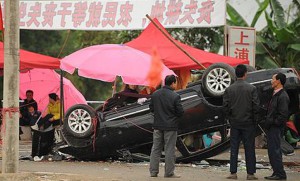
The struggle intensified on Sunday 24 February, when dozens of thugs armed with shovels and other weapons tried to scatter the protesters and break-up the occupation of the village square. The attackers, who wore orange hard hats and red armbands, were fought back by Shangpu residents exercising their legitimate right to collective self-defence, using bamboo poles and bricks from a construction site. In fierce battles, at least eight villagers were injured, some seriously, and six arrests were made. The 30 or so vehicles used by the thugs to carry out this attack were comprehensively smashed by Shangpu villagers. These wreckages strewn along the main road of the settlement should provide proof of the identity of the criminal attackers and who sent them.
While the local government of Jiexi county, which administers Shangpu, issued a statement saying the owners of the wrecked vehicles were under investigation, they also ordered the protesters to leave the square. But the occupation continues. The government’s statements are typical – wishing to give an even-handed appearance while in fact upholding what the CCP dictatorship calls ‘stability’, which is based on crushing the legitimate right to protest injustice.
According to AFP the police are now blockading Shangpu to outsiders, while the demonstrators are refusing to let officials inside. This standoff is occurring just days before the annual NPC meeting, and this can buy a certain amount of time for the protest movement. Many fear the authorities will use force once the NPC meeting is wrapped up. “For the purpose of maintaining stability, [the authorities] don’t want to use forceful measures before the meetings,” one local resident told AFP’s reporter. “We are afraid of them coming back.”
Lessons from Wukan
Negotiations are reportedly ongoing in Shangpu with representatives of the protest movement and the local authorities. In any such conflict negotiations are inevitable, but to win their main demands the protest movement must not slacken for a second, not put any trust in the government’s representatives, and trust only in the strength of its own organisation and preparedness for struggle. The occupation needs to continue with regular mobilisation, mass meetings and democratic structures. Any negotiations should be open, with no secret deals behind the backs of the movement. Shangpu’s protesters should hit back at attempts to isolate or encircle them by reaching out and forging contacts with other groups in struggle in other regions against the same corrupt system.
According to reports in regime-controlled Nanfang Daily, work teams of officials and government employees, nearly 300 altogether, have been mobilised from Jiexi county and from surrounding village committees, to visit households in Shangpu. The aim of such “house calls” is to pressurise residents into calling off their protests. However, Nanfang’s report is highly suspect. More reliable reports including from foreign journalists, such as AFP’s reporter, indicate that the protesters are keeping the government teams out of the village. This is the clearest sign that this struggle is copying some of the methods of the Wukan struggle.
At the same time there are reports of at least one other rural struggle underway in Guangdong province. This concerns the township of Dongyong, near Shanwei city. There, thousands of villagers have been protesting against the secret sale of communal lands by local CPP officials. According to the villagers at least 13 hectares of land have been illegally sold over the last 20 years.
The Dongyong protesters have faced several violent crackdowns by state forces, with hundreds of paramilitary police sent to the area, numerous injuries, and dozens of arrests. This struggle began last year, with villagers staging eight demonstrations in the streets to date. Encouraged by the apparent success of Wukan’s struggle, they appealed to the county-level government to punish corrupt local officials and return their stolen lands, but the government did nothing.
“A check that bounces”
After the Wukan rebellion of 2011, the CCP regime span its own version of events in the media to try to use this to its advantage. There was talk of a new “Wukan approach” from Wang Yang and the Guangdong provincial government, to settle grievances peacefully through discussions. In reality, this was already a gross distortion of what was really happening on the ground. We must remember that Wukan villagers faced vicious repression and one protest leader, Xue Jinbo, died after receiving horrific injuries in a police cell. The fact that new village revolts have flared across Guangdong, as in other provinces, shows that the regime did not change course as a result of Wukan.
The provincial leadership made concessions because they feared the Wukan movement could intensify, spread, and inspire other mass challenges to the CCP at local level. At the same time, the actual concessions made by Wang Yang and his team were minimal, with all substantial issues postponed until Wukan held its elections. What then happened was a twin strategy of continued selective repression and harassment by the security forces against the most radical layers of the Wukan protest movement on one side, and on the other side through upper levels of government blocking payments to Wukan and frustrating any possibility for the new elected leaders to pursue the movement’s main demands.
Many complain today “nothing has changed”. A split has opened up between those sections of the protest movement who oppose further protests and stress compromise with the CCP, and an understandably enraged layer who are seeking ways to restart the struggle because the key issue of land seizures remains unresolved. Elected village council head Lin Zulian has publicly said he regrets taking part in the 2011 protest movement. Speaking to Reuters, one Wukan activist summed up their sense of being cheated: “It’s like being given a check for two million yuan, but it bounces when you go to the bank.”
For socialists and the chinaworker.info website, the Wukan struggle gave many important examples of how to organise a mass movement. In our opinion it is the struggle that is important, not the December 2011 agreement or fictitious change of ‘approach’ by the CPP. Unfortunately the impressive Wukan movement lacked a leadership with a clear understanding of the role of the CCP state, or realisation that to achieve the movements’ demands, (for return of stolen lands, investigation of secret deals by the former village leaders, independent investigation of Xue Jinbo’s death) would require the struggle to continue, build its popular democratic organisations (independent of the state), and challenge the pro-capitalist policy of the CCP, of which largescale land seizures are a vital component. In return for the offer of village elections under the CCP’s supervision, the Wukan villagers dissolved their own independent village committee and demobilised the protests, which was a mistake. Democratic mass meetings to decide every new step of the struggle are vital.
As we wrote in our appraisal of the Wukan movement one year ago: “In reality, the official promises will remain on paper. It is an unfinished struggle, requiring further discussion over tactics, programme and methods of organisation, in order to achieve a real victory. The crucial ingredient that is lacking is a real, living, democratic party of struggle, based on the working class and youth, which can win the support of the poor peasants with a clear anti-capitalist and socialist programme against dictatorship. Such a party can only develop in a clandestine way at this stage, but that will change as more and even bigger struggles impend.” [The Wukan uprising and its lessons, Vincent Kolo and Zhang Shujie, 26 February 2012]
chinaworker.info calls for:
|

